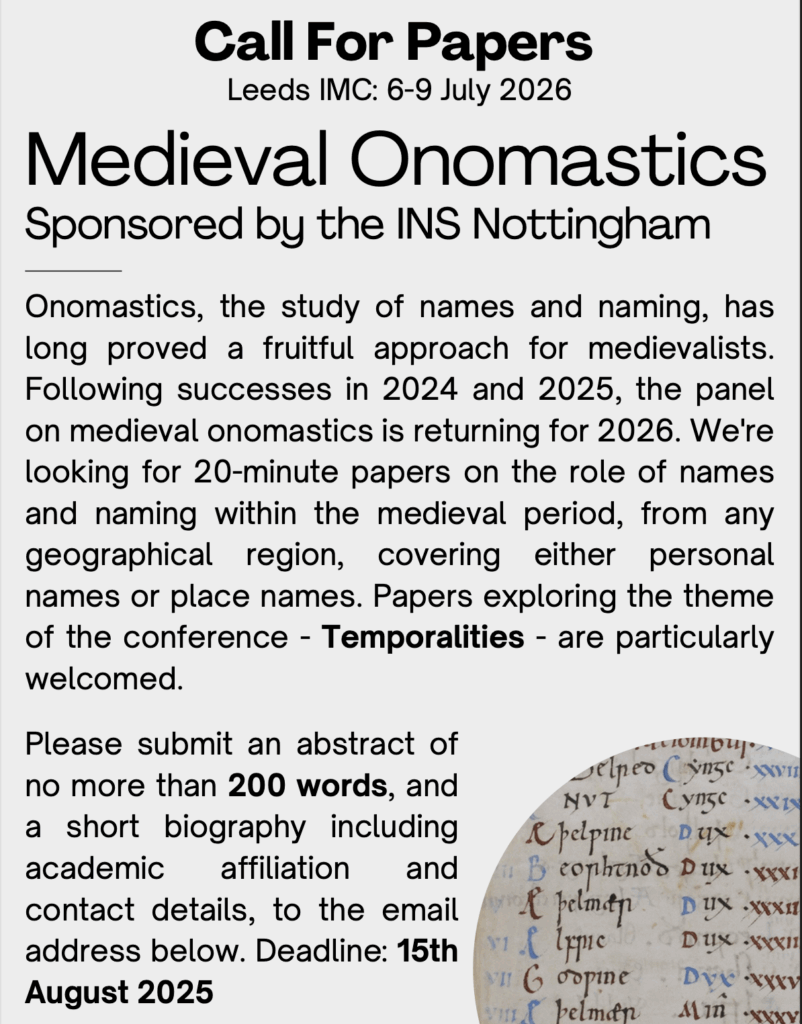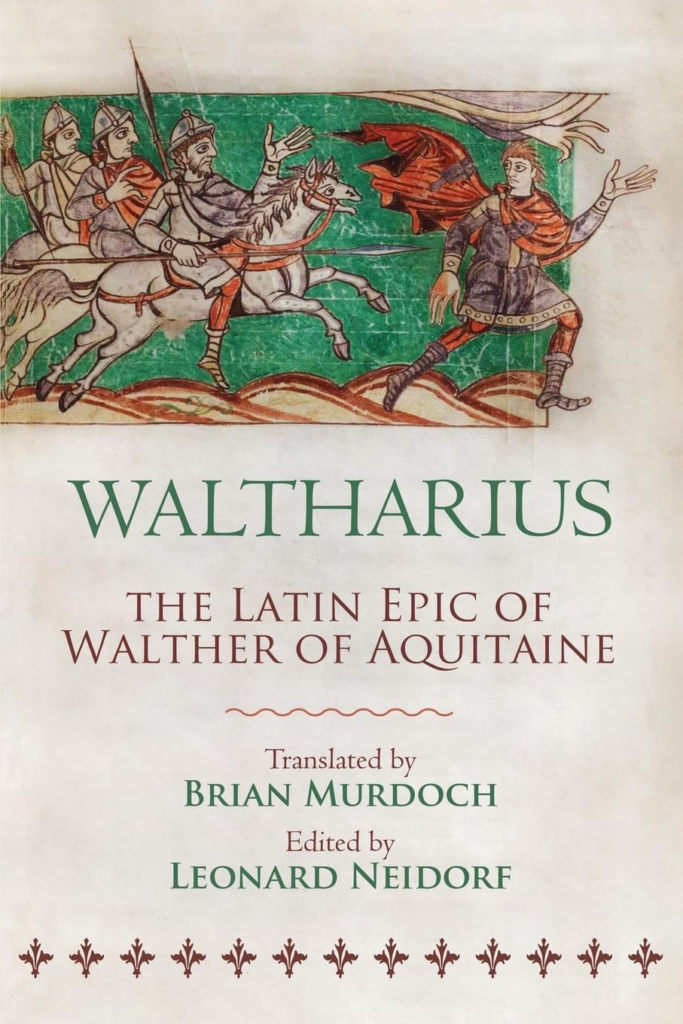Please see below a CfP for an onomastics panel at Leeds IMC in 2026 – all are welcome, from any discipline/medieval period/ geographical focus!


Please see below a CfP for an onomastics panel at Leeds IMC in 2026 – all are welcome, from any discipline/medieval period/ geographical focus!


20 and 21 April 2026 in Oxford
Submission Deadline: 15 September 2025.
Borders, Boundaries, and Barriers have become increasingly prominent themes in historical scholarship. Over the last decade, these concepts have been the focus of sustained scholarly interest, drawing especially upon theoretical frameworks and (trans-)national contexts. There is, therefore, a pressing need to examine how these constructs have shaped the lived experiences of historically marginalised groups, as well as how they were perceived, defined, and engaged with by those groups.
This conference seeks to reorient discussions around borders, boundaries, and barriers by foregrounding the experiences and perspectives of marginalised groups and considering how these divisions were perceived fromthe peripheries of societies. Rather than treating these concepts as abstract or solely geopolitical, we will explore the ways in which they have operated — both historically and historiographically — as tools of exclusion and differentiation.
Organised by Natasha Jenman (University of Oxford), Naomi Reiter (QMUL), and Dean A. Irwin (University of Lincoln/OCHJS), the conference will focus on individuals, religious groups, social groups, societal constructions, and natural phenomena. Participants are invited to explore the role played by evolving borders, boundaries, and barriers in the medieval world as part of group identities; and how groups used them to their advantage. Likewise, it will consider the extent to which borders, boundaries and barriers have been imposed upon the medieval world by modern scholars. Possible topics for consideration include, but are not limited to:
This conference adopts a broad chronological and geographical approach with submissions from all
historically-related disciplines being welcome. The conference will take place on 20 and 21 April 2026 in
Oxford. To submit, please send a title, abstract (c. 250 words), and a bio (c. 100 words) to:
bordersboundariesbarriers@gmail.com. Any questions should be directed to the same e-mail address.
The organisers hope to be able to offer a limited number of bursaries for students and those on low income. Please indicate in your proposal whether you would like to be considered for
one of these if this becomes possible.
Image ref: Latin Psalter (13th-15th C), f.9 – BL Add MS 28681,

Another academic year draws to a close: welcome, finally, to Week 8. The full Medieval Studies booklet is available here.
Next Thursday, 19 June, 4:30-6pm, is the official launch date for the “The Oxford Medieval Mystery Plays – the Film”. This is a wonderful chance to come together to celebrate the end of the year, and watch some of the excellent performances that were put on earlier in the term. At 4:45pm, the film will have its youtube premiere. You can tune in from anywhere in the world to comment; find the full schedule of when each play will start, more information, and a teaser here.
NB. If you are leaving us at the end of this year, and you would like to remain a member of this mailing list (and you are most welcome to do so), please register here with your personal email (link always available from our homepage https://medieval.ox.ac.uk/).
Monday
Tuesday
Wednesday
Thursday
Friday
Opportunities (new additions in bold)

Welcome to Week 5: the full Medieval Studies booklet is available here.
Thank you to those who have submitted their publications for the OMS impact booklet – please continue to send short blurbs to the Oxford Medieval Studies email address ASAP. Pictures also welcome!
Monday
Tuesday
Wednesday
Thursday
Friday
Opportunities (new additions in bold)

Welcome to Week 4: the full Medieval Studies booklet is available here.
OMS are working towards producing an ‘Impact Booklet’, emphasising all of the wonderful things that go on throughout the year. At the moment we are searching for publications – if you have published a relevant monograph/ edited volume/ edition during the past year, please drop an email to this address with a short blurb. Also: Applications to be the next Social Media Officer still welcome; contact Henrike Lähnemann for an informal discussion of the role!
Monday
Tuesday
Wednesday
Thursday
Friday
Opportunities (new additions in bold)

Medieval Epic. Special Issue of The Explicator
From the Editor-in-Chief: We invite contributions to The Explicator on any work of medieval literature that is conventionally considered (or should be considered) an epic. Eligible works include Beowulf, Waltharius, the Song of Roland, the Nibelungenlied, and other works traditionally associated with them. Less prominent works, such as bridal-quest epics (e.g., König Rother, Salman und Morolf) or epics pertaining to Dietrich von Bern, are likewise eligible for the issue. Contributions on German material are particularly welcome; they need not address whether the work being studied should be considered an epic. Each contribution needs only to put forward an original interpretation of a passage (or passages) in the work under scrutiny. Papers published in The Explicator should contain fewer than 2500 words.
Papers intended for this special issue should be uploaded directly through the Submission Portal on the website of The Explicator prior to 1 October 2025.

Leonard Neidorf, Editor-in-Chief, The Explicator, Distinguished Professor English Department Shenzhen University, https://leonardneidorf.com. Latest publication: Waltharius: The Latin Epic of Walther of Aquitaine (ed. Leonard Neidorf, trans. Brian Murdoch)

Welcome to week 7: the full booklet, as always, can be found here. A few important points to draw your immediate attention to:
Monday
Tuesday
Wednesday
Thursday
Friday
Upcoming
Opportunities

Welcome to week 6: the full booklet, as always, can be found here. This week features the last of the Ford Lectures: Jocelyn Wogan-Browne will be giving a lecture entitles ‘“Et lors que parlerez anglois /Que vous n’oubliez pas le François” (manuscript dedication, c. 1445): Off-shoring French?’. Of special interest to many of you will be the Ashmolean’s Krasis Scheme: ‘a unique, museum-based, interdisciplinary teaching and learning programme’. You can find out more about this wonderful opportunity here.
Errata or changes to announcements will be corrected in the google calendar and on the blog post, so please check these regularly.
Monday
Tuesday
Wednesday
Thursday
Friday
Upcoming
Opportunities


Week 5 rolls around – stave off the blues with an extensive course of medieval events. The full booklet, as always, can be found here.
Events
Monday
Tuesday
Wednesday
Thursday
Friday
Opportunities

Welcome to Week 4. Please find below the events and opportunities for this week: the full booklet, as always, can be found here. A reminder: the deadline for the OMS Small Grants scheme is this friday – don’t miss out!
Events
Monday
Tuesday
Wednesday
Thursday
Friday
For your Calendar
Opportunities